Sorry
- Year
- 2002
- Original title
- Gomen
- Japanese title
- ごめん
- Director
- Cast
- Running time
- 103 minutes
- Published
- 29 June 2014
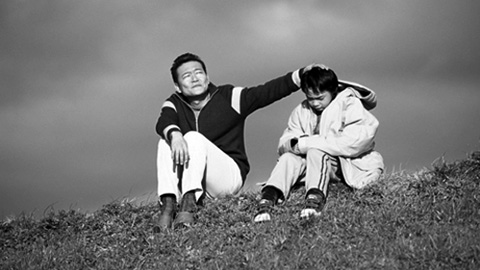
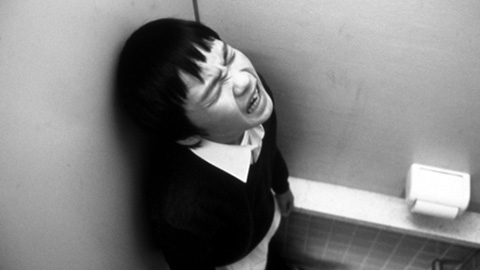
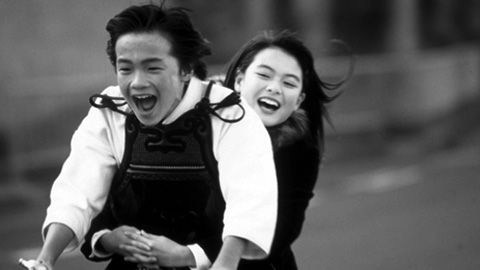
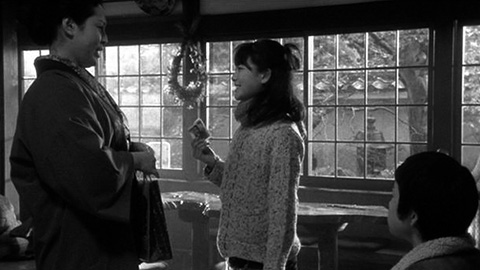
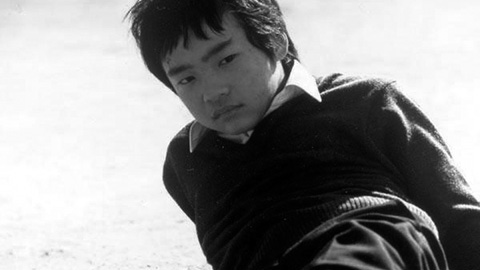
by Jasper Sharp
It’s easy to detect echoes of director Shin Togashi’s early collaborators, Shinji Somai and Hideyuki Hirayama, in this rather nice rite-of-passage comedy about the emotional growing pains of a 6th-grader growing up in Osaka, as he becomes plagued with the hormonal turmoil that accompanies puberty. The influence manifests itself both in the charming, non-patronising depiction of its pre-teen milieu, and the impishly irreverent approach to its mildly risqué subject matter, after an unprompted ejaculation during class marks the turbulent entry of Sei (Hisano) into the world of emotional confusion, spontaneous trouser bulges and stained underwear.
Newly awakened to the presence of his giggling female classmates swarming around his school playground and mesmerised by the gyrations of his teacher Miss Kurata (Komaki) during sports class, before he knows it, the rest of his peer group, including the swaggering, worldly-wise Kinta (Sato) and little squit Nyanko (Kurihara), are confessing crushes left, right and centre. As Sei is left to fend off the attentions of a balloon-faced admirer while weathering out the affectionate taunts of his mother (Kawai), he soon finds his head turned in another direction when one day, on an errand for his grandparents whom he is visiting in Kyoto, he notices the radiant Naoko (Sakuratani). Smitten, he tracks her down to a coffee shop run by her divorced father (Saito). However, Naoko happens to be just that little bit older than Sei, and has enough on her plate without worrying about some infatuated kid trailing her around like a lovesick puppy. Sometimes life just isn’t fair…
Sorry is a low-key yet surprisingly charming drama that was largely overlooked by both foreign festivals and critics during its initial release. In one sense, this is not so surprising, released as it was at a time when the Western gaze eastwards wilfully refused to acknowledge there might be more to Japanese cinema than J-horror and the latest Takashi Miike flick.
It is for this reason that I’ve decided to give Sorry its due here, to give some sort of identity to a film that perhaps characterises the vast majority of films the industry produces, or at least did produce just over a decade ago (which was down to a relatively low but still pretty significant 293 domestic releases in 2002). While perhaps not intended solely for local consumption, there is nonetheless the implicit assumption that it is not the sort of thing foreign audiences are ever going to really get excited about.
I’ve seen a lot of such films over the years writing for Midnight Eye, and have often hesitated about reviewing them for the simple fact I don’t think that there would be any real interest from most readers, who would have no opportunity of seeing them unless really actively trying to track them down (the original Japanese DVD release of Sorry did contain English subtitles). However, there’s a flipside to this, because it is this side of small-scale but generic Japanese cinema that is most in danger of disappearing from critical or scholarly purview as we march ever onwards into the digital age. If one doesn’t record its passing, its reception, or its context, how will future researchers ever get a broader sense of Japanese film culture in the early part of the millennium? Reams of pages have been written about Miyazaki, Battle Royale or Ring, as if they epitomise the very essence of Japanese cinema, but who in recent years has ever talked about Sorry?
This is a rhetorical question, because earlier this year viewers in certain British cities did have a chance to catch Sorry, as upon my recommendation it was included in the Japan Foundation UK’s East Side Stories: Japanese Cinema Depicting the Lives of Youth touring programme, giving me a long overdue opportunity to revisit it. The subtitled 35mm print that was struck up for its original festival circuit run over ten years ago had apparently deteriorated to such a state it was unplayable (although where exactly it played, I am not so sure, because I don’t remember anyone really talking about it), so instead it screened from a DigiBeta made specifically for the occasion - effectively the same quality as a DVD projection, but there’s never going to be the financial interest in older titles such as these for decent digital transfers to be made, so it's as good as one can hope for now.
This review is expanded from the programming notes I wrote for this occasion, which in turn were written up from notes I’d taken when I first saw the film on DVD while I was living in Japan when it was originally released. I’m relieved to say that it was a lot of fun revisiting Sorry.
The film was pretty much as I remembered it, and has dated rather well. There’s a pretty universal appeal here, and despite the occasionally close-to-the-bone belly laughs, both the humour and the situations are sure to prompt sniggers of recognition with audiences of all ages and cultures. The main problem, one all too common in Japanese film, is that of pacing, with several scenes left to play slightly longer than they should, although perhaps at 103 minutes, Sorry is hardly the worst offended in this respect. Nevertheless, whether huddled in his duffle-coat during that crucial first date, or cycling feverishly in his kendo gear across town to confess his feelings of undying devotion, Hisano’s endearingly earnest central performance, not to mention the interplay between all the child members of the cast (reminiscent at times of the younger characters in Ozu’s Good Morning) make this a film well worth seeking out. It made me nostalgic for a type of low-budget cinema still being shot on 35mm trading on naturalistic performances and strong scripts, that after little more than ten years, already looks like it belongs to a very different era.
After serving as an assistant director on Shun Nakahara’s critically-regarded The Cherry Orchard (Sakura no Sono, 1990), in which a group of students at an all-girl high school prepare to put on a production of Chekhov’s play of the same name, Togashi’s first directing credit was an instalment of the omnibus film Pokki Slope Love Story (Pokki-zaka Koi Monogatari, 1998), overseen by Shinji Somai. Then came the inevitable stint (for a director of his generation) in erotic V-cinema, followed by his 2001 mainstream debut with Off-Balance (2001), Togashi’s later works include romantic dramas such as Night of the Shooting Stars (Hoshi ni Negaio, 2003) and Angel’s Egg (Tenshi no Tamago, 2006) – not to be confused with Mamoru Oshii’s enigmatic anime of the same name from 1985. In 2005, his adaptation of Mitsuteru Yokoyama’s much-loved manga Tetsujin 28, about a young boy and his adventures with the giant robot left to him by his late inventor father, saw Togashi working with more fantastical subject matter, facilitated by a heavy use of CGI, while in 2013 he brought the classic 1980s NHK TV serial Oshin back to life, with newcomer Kokone Hamada playing the young girl of the title who, due to family poverty, is sent from her home to live and work in a wealthier household.